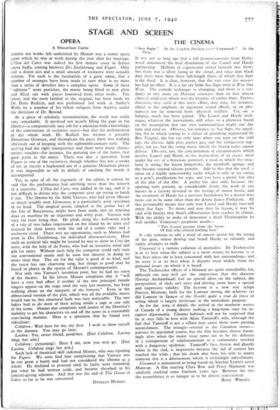STAGE AND SCREEN
OPERA
A Mozartian Curio AMONG the works left unfinished by Mozart was a comic opera upon which he was at work during the year after his marriage. L'Oca del Cairo was indeed his first mature essay in Italian opera buffa, coming between DiJ Entfiihrung and Figaro. Only half a dozen airs and a small amount of recitative were actually written. Yet such is the fascination of a great name, that a number of attempts have been made to turn what is no more than a series of sketches into a complete opera. Some of these " editions" were pastiches, the music being fitted to new plots and filled out with pieces borrowed from other works. The latest, and the most faithful to the original, has been made by Dr. Hans Redlich, and was performed last week at Sadler's Wells by a number of his fellow refugees from Austria, under the direction of Dr. Berend.
As a piece of scholarly reconstruction, the result was really very remarkable. It involved not merely filling the gaps in the libretto—a comparatively easy job for a musician with a knowledge of the conventions of recitativo secco—but also the orchestration of the whole work. Dr. Redlich has written a passably Mozartian Overture, and throughout the piece there was nothing obviously out of keeping with the eighteenth-century style. The scoring had the right transparency and there were many charac- teristic touches—for instance, the punning use of the horns, that gave point to the music. There was also a quotation from
Figaro in one of the recitatives, though whether this was a stroke of wit or merely a haphazard use of -a genuine Mozartian phrase it was impossible to tell in default of catching the words it accompanied
Yet, in spite of all the ingenuity of the editor, it cannot be said that the performance had anything more than the interest of a curiosity. L'Oca del Cairo was addled in its egg, and it is not difficult to divine why the composer gave up trying to hatch it out. The libretto by the Abbe Varesco, who had given Mozart so much trouble over Idomeneo, is a particularly poor specimen of its kind. The magical goose, adopted as the genius loci of the Isle of Roccasecca, might have been made into an amusing deus ex machina by an ingenious and witty poet. Varesco was very far from being that. He plods along the well-worn track of a tale of two ladies imprisoned on the island by its ruler and rescued by their lovers with the aid of a comic valet and a soubrette maid. There was no opportunity, such as Mozart had even in Die Entfiihrung, for individual characterisation. How such an artificial tale might be treated he was to show in Cosi fan tutte, with the help of da Ponte, who had an inventive mind and gift for satire. Without such help the composer could only turn out conventional music and he soon lost interest in doing no more than that. The air for the valet is good of its kind, and the tenor has one charming song, but things as good may be found in plenty in the operas of Mozart's contemporaries. Not only was Varesco's invention poor, but he had no sense of the theatre. In his letters Mozart complains that it " will have a very bad effect if neither of the two principal female singers appear on the stage until the very last moment, but keep walking about on the ramparts of the fortress." Even in the abbreviated version of the plot, which was all the available music would run to, this structural fault was very noticeable. The two ladies had to do most of their acting inside a cage at one side of the scene. Mozart also complains with justice of the librettist's inability to get his characters on and off the scene in a reasonably convincing manner. Here is a specimen that he found very ridiculous: Celidora Wait here for me, my dear. I wish to show myself to the duenna. You may go later. Lavina : Yes, sweet friend, good-bye. [Exit Celidora. Lavine sings her aria.]
Celidora (returning): Here I am, now you may go. [Exit Lavina. Celidora sings her aria.]
Such lack of theatrical skill sickened Mozart, who was ripening for Figaro. We soon find him complaining that Varesco was in too great a hurry and had not considered the libretto as a whole He declined to proceed until its faults were remedied, put what he had written aside, and became absorbed in his concert-giving schemes. And that was the end of The Goose of Cairo so far as he was concerned. DYNELEY HUSSEY. DYNELEY HUSSEY.


































 Previous page
Previous page